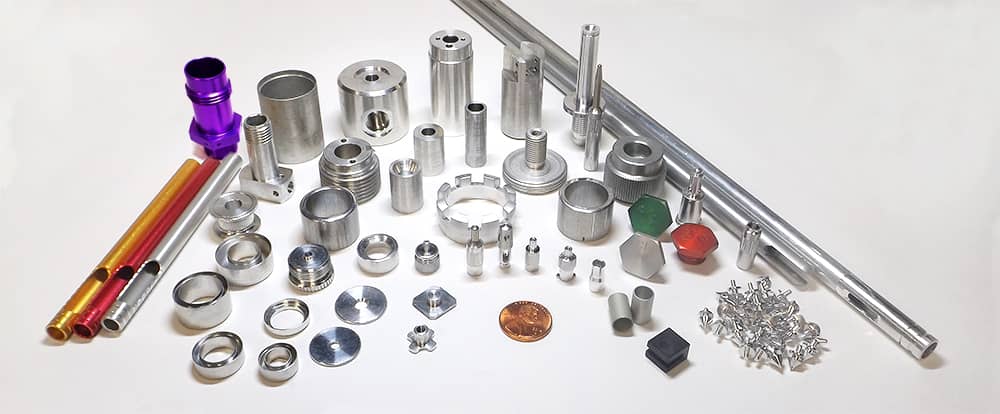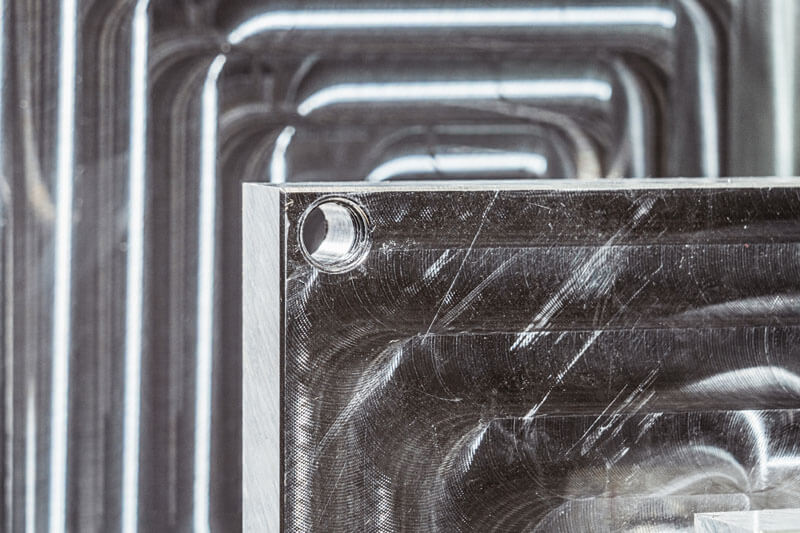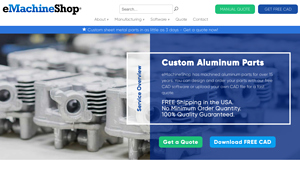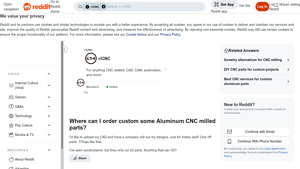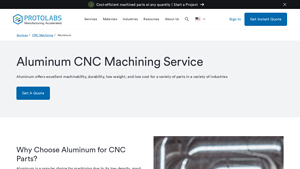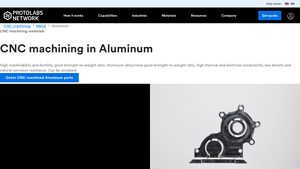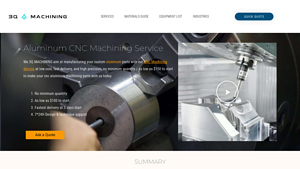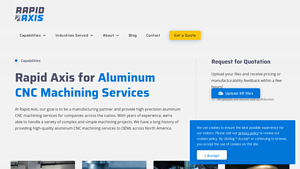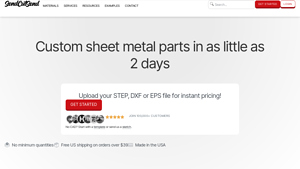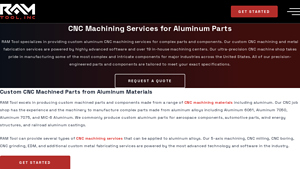Introduction: Navigating the Global Market for custom machined aluminum
In today’s competitive landscape, sourcing custom machined aluminum components can pose significant challenges for international B2B buyers, particularly those operating in Africa, South America, the Middle East, and Europe. The complexity of selecting the right materials, understanding various aluminum alloys, and navigating supplier capabilities can lead to costly mistakes. This guide aims to demystify the world of custom machined aluminum by providing an in-depth exploration of the types of aluminum available, their specific applications, and practical strategies for vetting suppliers.
From automotive and aerospace industries to construction and electronics, aluminum’s lightweight, durable, and corrosion-resistant properties make it an ideal choice for various applications. Buyers will gain insights into the different aluminum alloys, such as 6061, 5052, and 7075, each tailored for specific performance requirements. Furthermore, this guide will address crucial aspects like cost considerations, machining techniques, and surface finishing options, ensuring that you make informed purchasing decisions.
By equipping international buyers with the knowledge needed to navigate the complexities of the custom machined aluminum market, this guide empowers you to forge strategic partnerships with suppliers who can meet your specifications and quality standards. Whether you’re looking to enhance your product line or streamline your manufacturing process, understanding the nuances of custom machined aluminum is essential for success in today’s global marketplace.
Understanding custom machined aluminum Types and Variations
| Type Name | Key Distinguishing Features | Primary B2B Applications | Brief Pros & Cons for Buyers |
|---|---|---|---|
| Aluminum 6061 | Excellent machinability, good weldability | Automotive, aerospace, marine parts | Pros: Versatile, cost-effective. Cons: Moderate corrosion resistance. |
| Aluminum 5052 | High corrosion resistance, good formability | Marine applications, fuel tanks, pressure vessels | Pros: Durable, easy to work with. Cons: Not heat-treatable. |
| Aluminum 2024 | High strength-to-weight ratio, fatigue resistant | Aircraft structures, military applications | Pros: Strong, lightweight. Cons: Poor corrosion resistance, not weldable. |
| Aluminum 7075 | High strength, good fatigue resistance | Aerospace components, sporting goods | Pros: Exceptional strength. Cons: Limited corrosion resistance, higher cost. |
| Aluminum 6063 | Good extrudability, moderate strength | Architectural applications, window frames | Pros: Excellent for complex shapes. Cons: Lower strength compared to other alloys. |
What Makes Aluminum 6061 a Preferred Choice for B2B Buyers?
Aluminum 6061 is a highly versatile alloy known for its excellent machinability and weldability. It is commonly used in a variety of applications, including automotive components, aerospace structures, and marine parts. When sourcing this alloy, buyers should consider its moderate corrosion resistance, which can be enhanced through surface treatments. Its balance of strength and weight makes it a cost-effective option for many industries, appealing to companies looking for reliable and flexible manufacturing solutions.
Why is Aluminum 5052 Ideal for Marine Applications?
Aluminum 5052 is renowned for its high corrosion resistance, particularly in marine environments, making it a preferred choice for applications such as fuel tanks and pressure vessels. This alloy features good formability, allowing for easy shaping and assembly. However, it is essential for buyers to note that Aluminum 5052 cannot be heat-treated, which may limit its application in high-stress environments. Overall, its durability and ease of fabrication make it an attractive option for industries prioritizing longevity and resilience.
How Does Aluminum 2024 Meet the Demands of Aerospace?
Aluminum 2024 is specifically designed for high-strength applications, making it a staple in the aerospace industry. With a high strength-to-weight ratio and excellent fatigue resistance, it is commonly used in aircraft structures and military applications. However, its poor corrosion resistance requires surface treatments to ensure durability in harsh environments. B2B buyers should evaluate their specific needs for strength and weight against the alloy’s limitations regarding weldability and corrosion, ensuring optimal selection for critical applications.
What Are the Advantages of Using Aluminum 7075 in High-Performance Applications?
Aluminum 7075 is recognized for its outstanding strength and fatigue resistance, making it a top choice for high-performance applications such as aerospace components and sporting goods. While this alloy offers exceptional mechanical properties, its limited corrosion resistance and higher cost may be drawbacks for some buyers. When sourcing this material, companies should assess the trade-offs between performance requirements and budget constraints, as well as consider potential surface treatments to enhance longevity in demanding environments.
Why Choose Aluminum 6063 for Architectural Applications?
Aluminum 6063 is characterized by its good extrudability and moderate strength, making it ideal for architectural applications such as window frames and railings. Its ability to form complex shapes allows for innovative designs in construction. However, buyers should be mindful that its strength is not as high as other alloys, which may limit its use in load-bearing applications. Ultimately, Aluminum 6063 provides an excellent balance between form and function, appealing to architects and builders seeking aesthetic and practical solutions.
Key Industrial Applications of custom machined aluminum
| Industry/Sector | Specific Application of custom machined aluminum | Value/Benefit for the Business | Key Sourcing Considerations for this Application |
|---|---|---|---|
| Aerospace | Aircraft components (e.g., fuselage frames) | Lightweight materials enhance fuel efficiency and reduce operational costs | Compliance with stringent safety and quality standards; sourcing from certified manufacturers |
| Automotive | Engine parts and structural components | Improved fuel efficiency and reduced emissions due to weight savings | Need for precision machining and ability to handle complex geometries; quick turnaround times |
| Construction | Structural frames and architectural elements | Corrosion resistance and durability in harsh environments | Availability of various aluminum alloys; adherence to local building regulations |
| Electronics | Enclosures for electronic devices | Enhanced thermal management and protection from environmental factors | Compatibility with electronic components; custom design capabilities for specific applications |
| Marine | Boat hulls and fittings | Resistance to corrosion in saltwater environments | Expertise in marine-grade aluminum alloys; ability to provide surface treatments for enhanced durability |
How is Custom Machined Aluminum Used in Aerospace Applications?
In the aerospace industry, custom machined aluminum is critical for producing lightweight yet strong components such as fuselage frames, wing structures, and engine parts. These components must withstand extreme pressures and temperatures while maintaining structural integrity. By sourcing high-quality aluminum alloys, manufacturers can achieve significant weight savings, leading to improved fuel efficiency and reduced operational costs. International buyers should prioritize suppliers with certifications that meet aerospace industry standards, ensuring reliability and safety.
What Role Does Custom Machined Aluminum Play in the Automotive Sector?
The automotive sector utilizes custom machined aluminum extensively for engine parts, transmission housings, and structural components. The lightweight nature of aluminum contributes to better fuel efficiency and lower emissions, aligning with global sustainability goals. For B2B buyers, it is essential to work with suppliers capable of precision machining to accommodate complex designs and tight tolerances. Additionally, quick turnaround times can be a deciding factor in maintaining production schedules.
How is Custom Machined Aluminum Beneficial in Construction?
In construction, custom machined aluminum serves as a robust solution for structural frames, window frames, and architectural elements. Its corrosion resistance and lightweight properties make it ideal for buildings in diverse environments, including earthquake-prone areas. Buyers in this sector should consider the availability of various aluminum alloys that meet specific structural requirements and ensure compliance with local building codes. Collaborating with suppliers who understand these regulations can facilitate smoother project execution.
What are the Applications of Custom Machined Aluminum in Electronics?
In the electronics industry, custom machined aluminum is used to create enclosures that provide protection for sensitive components. These enclosures enhance thermal management and ensure durability against environmental factors. International B2B buyers need to focus on suppliers who can offer custom designs that integrate seamlessly with their electronic components. Furthermore, ensuring compatibility with thermal and electrical specifications is crucial for optimal performance.
How is Custom Machined Aluminum Used in Marine Applications?
Custom machined aluminum is pivotal in marine applications, particularly for constructing boat hulls and fittings. Its inherent resistance to corrosion, especially in saltwater environments, makes it a preferred choice for boat manufacturers. For buyers in the marine sector, sourcing expertise in marine-grade aluminum alloys is vital. Additionally, suppliers should provide surface treatments that enhance the durability and longevity of the components in harsh marine conditions.
3 Common User Pain Points for ‘custom machined aluminum’ & Their Solutions
Scenario 1: Navigating Complex Specifications for Custom Parts
The Problem: Many B2B buyers face challenges when it comes to specifying the exact requirements for custom machined aluminum components. This often includes selecting the right aluminum alloy, determining tolerances, and deciding on surface finishes. Misunderstandings or lack of clarity can lead to prototypes that do not meet performance expectations, resulting in costly delays and wasted resources. Buyers may also struggle with the technical jargon often used in engineering and manufacturing, making it difficult to communicate effectively with suppliers.
The Solution: To overcome these challenges, buyers should invest time in understanding the properties of different aluminum alloys and their respective applications. For instance, knowing that Aluminum 6061 is versatile for general purposes while Aluminum 7075 is suited for high-stress applications can guide decisions. Collaborating closely with suppliers during the design phase is crucial. Utilize design software that allows for visualizing and simulating parts before production. Furthermore, creating a detailed specification document that outlines the intended use, environmental factors, and performance expectations will help align the manufacturer’s capabilities with the buyer’s needs. Engaging in regular communication throughout the process can also help clarify any uncertainties.
Scenario 2: Dealing with Lead Times and Delivery Issues
The Problem: B2B buyers often encounter extended lead times and unpredictable delivery schedules when sourcing custom machined aluminum parts. This situation can be exacerbated by global supply chain disruptions or the sourcing of specific alloys that may not be readily available. Delayed parts can halt production lines, leading to missed deadlines and potentially damaging client relationships.
The Solution: To mitigate lead time issues, buyers should establish strong relationships with multiple suppliers and maintain a diversified sourcing strategy. It is advisable to discuss lead times upfront and build buffer periods into project timelines. When placing orders, buyers can opt for standard designs or commonly used alloys that are more likely to be available. Additionally, consider investing in inventory management solutions that allow for just-in-time manufacturing, ensuring that parts are available as needed without overcommitting resources. Regularly reviewing and assessing supplier performance can also help in selecting partners who are reliable and responsive to urgent needs.
Scenario 3: Ensuring Quality and Consistency Across Orders
The Problem: Quality inconsistency is a prevalent concern for B2B buyers when ordering custom machined aluminum parts. Variations in manufacturing processes, material quality, or even the operators’ skill levels can lead to discrepancies between different batches. Such inconsistencies can compromise product integrity, resulting in performance failures and necessitating costly rework or replacements.
The Solution: To ensure consistent quality, buyers should implement a robust quality assurance process that includes detailed inspection criteria. This can involve requesting certifications for materials used, such as ASTM standards for aluminum alloys, and conducting regular audits of the manufacturing process. Engaging suppliers who offer comprehensive quality control measures, such as in-process inspections and final quality checks, can significantly reduce the risk of inconsistencies. Additionally, establishing a clear feedback loop with suppliers regarding quality issues allows for timely corrections and continuous improvement. Consider utilizing third-party inspection services for critical components to add an extra layer of quality assurance.
Strategic Material Selection Guide for custom machined aluminum
What Are the Key Properties and Applications of Common Aluminum Alloys in Custom Machining?
When selecting materials for custom machined aluminum components, understanding the properties, advantages, and limitations of various aluminum alloys is crucial. This knowledge helps international B2B buyers make informed decisions based on performance requirements, cost considerations, and regional compliance standards.
How Does Aluminum 6061 Perform in Custom Machined Applications?
Aluminum 6061 is one of the most widely used aluminum alloys due to its excellent mechanical properties and weldability. It has a good strength-to-weight ratio, making it suitable for a variety of applications, including automotive parts, marine structures, and aerospace components. Its temperature rating can withstand moderate heat, and it offers decent corrosion resistance, particularly when anodized.
Pros: The alloy is easy to machine and weld, which reduces manufacturing complexity. It is also cost-effective, making it an attractive option for mass production.
Cons: While it offers good strength, it is not as strong as some other alloys like 7075. Additionally, it may require surface treatments for enhanced corrosion resistance in harsh environments.
Impact on Application: Aluminum 6061 is compatible with various media, including water and oils, making it versatile for multiple sectors.
International Considerations: Buyers from regions like Europe and the Middle East should ensure compliance with standards such as ASTM and EN specifications for quality assurance.
What Makes Aluminum 5052 a Preferred Choice for Specific Applications?
Aluminum 5052 is known for its exceptional corrosion resistance, particularly in marine environments. It is highly formable and can be easily bent or shaped, making it ideal for applications like fuel tanks, marine components, and pressure vessels.
Pros: Its high resistance to corrosion and good weldability make it suitable for applications exposed to moisture and chemicals.
Cons: Aluminum 5052 cannot be heat-treated, which limits its strength enhancement options. It is also more expensive than some other alloys.
Impact on Application: This alloy is particularly effective in environments where saltwater or chemicals are present, ensuring longevity and reliability.
International Considerations: Buyers should be aware of local regulations regarding material safety and environmental compliance, especially in marine applications.
Why Choose Aluminum 7075 for High-Strength Applications?
Aluminum 7075 is one of the strongest aluminum alloys available, making it ideal for applications that require high strength and fatigue resistance, such as aircraft fittings and military applications. It has a relatively high cost due to its strength characteristics and the complexity of its manufacturing process.
Pros: The alloy’s superior strength-to-weight ratio is unmatched, making it a top choice for critical applications where performance is paramount.
Cons: Its corrosion resistance is lower than that of 6061 and 5052, necessitating protective coatings. The machining process can also be more complex, leading to higher manufacturing costs.
Impact on Application: Suitable for high-stress environments, 7075 is often used in aerospace and defense industries where safety and performance are critical.
International Considerations: Compliance with aerospace standards, such as those set by the FAA or EASA, is essential for buyers in this sector.
Summary of Material Selection for Custom Machined Aluminum
| Material | Typical Use Case for custom machined aluminum | Key Advantage | Key Disadvantage/Limitation | Relative Cost (Low/Med/High) |
|---|---|---|---|---|
| Aluminum 6061 | Automotive parts, marine structures | Excellent machinability and weldability | Moderate strength compared to other alloys | Medium |
| Aluminum 5052 | Fuel tanks, marine components | Exceptional corrosion resistance | Cannot be heat-treated | Medium |
| Aluminum 7075 | Aircraft fittings, military applications | High strength and fatigue resistance | Lower corrosion resistance | High |
This guide provides a comprehensive overview of common aluminum alloys for custom machining, focusing on their properties, applications, and considerations for international buyers. By understanding these factors, B2B buyers can better align their material choices with their operational needs and compliance requirements.
In-depth Look: Manufacturing Processes and Quality Assurance for custom machined aluminum
What Are the Main Stages in the Manufacturing Process of Custom Machined Aluminum?
The manufacturing of custom machined aluminum involves several critical stages, each designed to ensure precision, quality, and efficiency. The primary stages include material preparation, forming, assembly, and finishing.
Material Preparation: How Is Aluminum Prepared for Machining?
The first step involves selecting the appropriate aluminum alloy based on the specific requirements of the application. Common alloys such as 6061, 5052, and 7075 are chosen for their unique properties, including strength, corrosion resistance, and machinability. Once the material is selected, it is cut into manageable sizes, often using saws or shears. This initial processing ensures that the raw material is suitable for the subsequent machining operations.
What Forming Techniques Are Utilized in Aluminum Machining?
Forming is where the raw aluminum undergoes various machining processes. Common techniques include:
-
CNC Milling: This method uses rotating cutting tools to remove material and create complex shapes. CNC milling is renowned for its precision and ability to work with tight tolerances, making it ideal for intricate parts.
-
CNC Turning: Employed to produce cylindrical parts, this technique involves feeding cutting tools into rotating aluminum stock. It is particularly useful for producing shafts and fittings.
-
Waterjet Cutting: This technique utilizes a high-pressure stream of water mixed with abrasives to cut aluminum sheets. It is effective for producing clean edges and is suitable for a variety of thicknesses.
-
EDM (Electrical Discharge Machining): Ideal for intricate designs, EDM uses electrical sparks to erode material, allowing for the creation of complex geometries and high dimensional accuracy.
These techniques enable manufacturers to meet specific design requirements while maintaining high levels of efficiency.
How Is Assembly Managed in Custom Machined Aluminum Production?
After forming, parts may require assembly, especially in complex components that consist of multiple machined pieces. This stage includes processes such as welding, riveting, or bolting. The assembly must be conducted with precision to ensure that the final product meets the intended specifications.
What Finishing Options Are Available for Custom Machined Aluminum?
Finishing processes enhance the aesthetic and functional properties of the machined parts. Common finishing techniques include:
-
Anodizing: This electrochemical process increases corrosion resistance and surface hardness while allowing for dyeing to achieve various colors.
-
Powder Coating: This method involves applying a dry powder that is then cured under heat to form a protective layer. It enhances durability and offers a range of color options.
-
Plating and Polishing: These methods improve surface finish and can provide additional corrosion resistance. They are often used for components exposed to harsh environments.
What Quality Control Measures Are Essential in Custom Machined Aluminum Production?
Quality assurance is critical in the manufacturing of custom machined aluminum, ensuring that products meet both international standards and specific customer requirements. Key quality control measures include:
Which International Standards Apply to Aluminum Machining?
International standards such as ISO 9001 are crucial for ensuring consistent quality management systems. ISO 9001 focuses on process improvements and customer satisfaction, making it a foundational framework for quality assurance in manufacturing. Additionally, industry-specific certifications such as CE for European markets or API for the oil and gas sector may also apply, depending on the application.
What Are the Key Quality Control Checkpoints in the Manufacturing Process?
Quality control checkpoints are implemented at various stages of the manufacturing process:
-
Incoming Quality Control (IQC): This initial checkpoint involves inspecting raw materials to ensure they meet specified standards before production begins.
-
In-Process Quality Control (IPQC): During the manufacturing process, ongoing inspections are conducted to monitor dimensions, tolerances, and surface finishes. This step helps to identify any defects early, minimizing waste.
-
Final Quality Control (FQC): Once production is complete, a thorough inspection of the finished parts is performed. This may include dimensional checks, functional tests, and surface finish evaluations.
What Common Testing Methods Are Used in Quality Assurance?
Testing methods for custom machined aluminum parts often include:
-
Dimensional Inspection: Utilizing tools such as calipers and micrometers to verify that parts meet specified dimensions.
-
Non-Destructive Testing (NDT): Techniques like ultrasonic testing or dye penetrant tests are employed to detect internal flaws without damaging the part.
-
Mechanical Testing: This includes tensile tests to evaluate strength and ductility, ensuring that parts can withstand operational stresses.
How Can B2B Buyers Verify Supplier Quality Control?
B2B buyers must conduct thorough due diligence to verify the quality control practices of their suppliers. Here are some actionable steps:
-
Supplier Audits: Regular audits of suppliers can provide insights into their quality management systems and adherence to international standards.
-
Quality Reports: Requesting detailed quality reports and certificates of compliance can help buyers understand the supplier’s testing procedures and outcomes.
-
Third-Party Inspections: Engaging third-party inspection services can provide an objective assessment of the supplier’s quality control measures and the integrity of the finished products.
What Are the QC and Certification Nuances for International B2B Buyers?
For international buyers, understanding the nuances of quality control and certification is crucial. Different regions may have specific requirements that affect compliance and market entry. For instance, buyers in Europe may need to ensure products meet CE marking requirements, while those in the Middle East may encounter specific regulatory frameworks.
Additionally, language barriers and cultural differences can impact communication regarding quality standards. Establishing clear documentation and maintaining open lines of communication with suppliers can mitigate potential issues and ensure that quality expectations are met.
Conclusion
In summary, the manufacturing processes and quality assurance measures for custom machined aluminum are multifaceted and require careful consideration from B2B buyers. Understanding the stages of production, the importance of quality control, and the specifics of international standards can help buyers make informed decisions when selecting suppliers. By prioritizing these factors, companies can ensure they receive high-quality aluminum components that meet their operational needs.
Practical Sourcing Guide: A Step-by-Step Checklist for ‘custom machined aluminum’
Introduction
Navigating the procurement of custom machined aluminum parts can be complex, especially for international B2B buyers. This guide provides a practical, step-by-step checklist designed to streamline your sourcing process. By following these steps, you can ensure that you select the right suppliers, materials, and processes to meet your specific needs.
Step 1: Define Your Technical Specifications
Before you begin sourcing, it is essential to articulate your technical requirements clearly. This includes dimensions, tolerances, and specific properties of the aluminum alloy you need, such as strength or corrosion resistance.
- What to consider: Identify the application of your parts, as this will influence the choice of alloy (e.g., 6061 for structural applications or 5052 for marine use).
Step 2: Research and Identify Potential Suppliers
Take the time to research suppliers who specialize in custom machined aluminum. Look for companies with a proven track record in your industry and those that have experience with similar projects.
- Key resources: Utilize platforms like ThomasNet, Alibaba, or industry-specific directories to find reputable suppliers. Pay attention to their customer reviews and case studies.
Step 3: Evaluate Supplier Capabilities
It’s crucial to assess whether a supplier can meet your production needs. Investigate their machining capabilities, such as CNC milling, turning, and secondary processes like anodizing or powder coating.
- Things to look for: Ensure they have the right machinery and technology to handle your specific requirements and can work within your desired timelines.
Step 4: Request Quotes and Compare Pricing
Once you have shortlisted potential suppliers, request detailed quotes. Ensure that the quotes include all costs, such as material, machining, finishing, and shipping.
- What to analyze: Compare not just the prices but also the payment terms, lead times, and any minimum order quantities. This helps in making an informed decision based on your budget and timelines.
Step 5: Verify Supplier Certifications and Quality Control
Quality assurance is paramount when sourcing custom machined aluminum. Check if the suppliers hold relevant certifications, such as ISO 9001, which indicates a commitment to quality management.
- Quality indicators: Inquire about their quality control processes, including inspections and testing methods they employ to ensure that parts meet specifications.
Step 6: Request Samples or Prototypes
Before committing to a large order, it’s advisable to request samples or prototypes of your custom machined parts. This allows you to evaluate their quality and precision firsthand.
- Benefits of sampling: Testing samples can help identify any potential issues with design or manufacturing before full-scale production, saving time and resources.
Step 7: Establish Clear Communication Channels
Effective communication is vital for successful collaboration with your chosen supplier. Establish clear points of contact and preferred methods for updates and feedback.
- Best practices: Use project management tools or regular check-in meetings to ensure that both parties are aligned throughout the production process, from design to delivery.
By following this checklist, international B2B buyers can navigate the complexities of sourcing custom machined aluminum parts more effectively, ensuring they make informed decisions that align with their operational needs.
Comprehensive Cost and Pricing Analysis for custom machined aluminum Sourcing
What Are the Key Cost Components in Custom Machined Aluminum?
When sourcing custom machined aluminum, understanding the cost structure is crucial for B2B buyers. The primary cost components include:
-
Materials: The choice of aluminum alloy significantly impacts costs. Common alloys such as 6061, 5052, and 7075 vary in price due to their mechanical properties and availability. For instance, 7075 is generally more expensive due to its higher strength and specific applications in aerospace.
-
Labor: Labor costs can fluctuate based on the complexity of the machining processes required. CNC machining, for example, demands skilled operators and can increase costs, particularly in regions with higher wage standards.
-
Manufacturing Overhead: This includes expenses related to equipment maintenance, facility costs, and utilities. Efficient production setups can help minimize overhead, making it essential for buyers to consider suppliers with optimized operations.
-
Tooling: Custom tooling may be necessary for specific designs. The initial investment in tooling can be significant but is often amortized over larger production runs, impacting the overall cost per unit.
-
Quality Control (QC): Ensuring that parts meet specifications can involve additional testing and inspection processes, which contribute to overall costs. Certifications such as ISO can also add to expenses but may be necessary for certain industries.
-
Logistics: Shipping costs can vary widely based on the distance, weight, and dimensions of the parts. International buyers must also consider duties and taxes, which can add to total costs.
-
Margin: Suppliers will typically include a markup to cover their risks and profit margin. This can vary based on the supplier’s market position and the competitiveness of the offer.
How Do Price Influencers Affect Custom Machined Aluminum Costs?
Several factors can influence the pricing of custom machined aluminum parts:
-
Volume and Minimum Order Quantity (MOQ): Generally, higher volumes lead to lower per-unit costs due to economies of scale. Suppliers may offer better pricing for larger orders, making it essential for buyers to assess their needs carefully.
-
Specifications and Customization: Complex designs or tight tolerances may require advanced machining techniques, increasing costs. Buyers should evaluate whether all specifications are necessary for their applications.
-
Materials and Quality Standards: The choice of alloy and the required quality certifications will affect pricing. High-performance alloys or those with specific certifications will typically command higher prices.
-
Supplier Factors: Relationships with suppliers can influence pricing. Established suppliers may offer better terms or discounts based on long-term contracts or reliable business partnerships.
-
Incoterms: Understanding shipping terms and responsibilities can help buyers anticipate additional costs. For instance, choosing DDP (Delivered Duty Paid) can simplify logistics but may come at a higher upfront cost.
What Are the Best Buyer Tips for Cost-Efficiency in Custom Machined Aluminum Sourcing?
To maximize cost-efficiency when sourcing custom machined aluminum, consider the following strategies:
-
Negotiate Pricing: Engage suppliers in discussions about pricing and terms. Bulk purchasing or long-term contracts can often lead to better rates.
-
Evaluate Total Cost of Ownership (TCO): Look beyond the initial price. Consider shipping, handling, and potential costs related to delays or quality issues. A slightly higher upfront cost may result in lower overall expenses.
-
Be Aware of Pricing Nuances for International Sourcing: Buyers from Africa, South America, the Middle East, and Europe should be mindful of currency fluctuations, trade tariffs, and local market conditions that can impact pricing.
-
Investigate Supplier Capabilities: Assess whether a supplier can handle your specific requirements. A supplier with advanced capabilities may save costs in the long run through reduced waste and faster turnaround times.
-
Seek Multiple Quotes: Obtaining quotes from several suppliers can provide a clearer picture of the market rates and help in negotiating better terms.
Conclusion
Understanding the cost components and price influencers in custom machined aluminum sourcing is essential for international B2B buyers. By employing strategic negotiation tactics and considering the total cost of ownership, buyers can make informed decisions that lead to significant savings and improved project outcomes. Always remember that prices can vary widely based on many factors, and it’s prudent to approach sourcing with a comprehensive strategy in mind.
Alternatives Analysis: Comparing custom machined aluminum With Other Solutions
Understanding Alternatives to Custom Machined Aluminum
In the realm of manufacturing, selecting the appropriate material or technology for specific applications is critical. Custom machined aluminum is a popular choice due to its excellent strength-to-weight ratio, versatility, and machinability. However, various alternatives exist, each with unique advantages and disadvantages. This analysis will compare custom machined aluminum against two viable alternatives: injection-molded plastics and stainless steel fabrication.
Comparison Table
| Comparison Aspect | Custom Machined Aluminum | Injection-Molded Plastics | Stainless Steel Fabrication |
|---|---|---|---|
| Performance | High strength-to-weight ratio; excellent durability | Good for lightweight applications; less durable under extreme conditions | Superior strength; excellent corrosion resistance |
| Cost | Moderate to high; varies with complexity and volume | Generally lower; cost-effective for high volumes | Higher than aluminum; labor-intensive |
| Ease of Implementation | Requires CNC machining expertise; longer lead times | Fast production for high volumes; requires specific tooling | Complex processes; longer setup time |
| Maintenance | Low; corrosion-resistant with proper treatment | Varies; can degrade under UV exposure | Very low; highly resistant to wear and corrosion |
| Best Use Case | Aerospace, automotive, and high-performance applications | Consumer goods, packaging, and less demanding environments | Heavy machinery, industrial applications, and food processing |
Detailed Breakdown of Alternatives
Injection-Molded Plastics
Injection-molded plastics are a preferred alternative for many applications, particularly where weight reduction is necessary. These materials can be produced rapidly and in large quantities, making them cost-effective for mass production. They are ideal for consumer goods and packaging but may lack the durability and heat resistance required in high-performance settings. Additionally, while the initial tooling cost is high, the per-unit cost decreases significantly with volume. However, the environmental impact and potential for degradation under UV light should be considered when selecting this option.
Stainless Steel Fabrication
Stainless steel fabrication offers superior strength and corrosion resistance compared to aluminum, making it suitable for heavy-duty applications. Industries such as food processing and pharmaceuticals often favor stainless steel due to its hygienic properties. However, the initial costs are typically higher, and the fabrication process can be labor-intensive, leading to longer lead times. Stainless steel is also heavier than aluminum, which may be a disadvantage in applications where weight is a critical factor. Despite these drawbacks, its durability and longevity can justify the investment in demanding environments.
Conclusion: Choosing the Right Solution for Your Needs
When selecting between custom machined aluminum and its alternatives, B2B buyers must carefully assess their specific requirements. Factors such as performance needs, budget constraints, production volume, and application environment play crucial roles in this decision-making process. Custom machined aluminum remains a strong contender for applications requiring a balance of lightweight properties and strength. However, alternatives like injection-molded plastics and stainless steel fabrication may provide more suitable solutions depending on the context. Ultimately, understanding the nuances of each option will empower buyers to make informed choices that align with their operational goals and project specifications.
Essential Technical Properties and Trade Terminology for custom machined aluminum
What Are the Key Technical Properties of Custom Machined Aluminum?
When it comes to custom machined aluminum, understanding its technical properties is essential for making informed purchasing decisions. Here are some critical specifications to consider:
-
Material Grade
Aluminum alloys are categorized by their alloying elements, each offering distinct properties. Common grades include 6061, 5052, and 7075. For example, 6061 is well-known for its strength and weldability, making it ideal for structural applications. Knowing the right grade helps buyers select materials that meet specific performance requirements, ensuring durability and functionality in their applications. -
Tolerance
Tolerance refers to the permissible limit of variation in a physical dimension of a machined part. Tight tolerances (e.g., ±0.001 inches) are crucial in industries like aerospace and automotive, where precision is non-negotiable. Understanding tolerance requirements is vital for buyers to ensure that their components fit seamlessly within larger assemblies, reducing the risk of costly rework or failures. -
Surface Finish
The surface finish of a machined part affects its aesthetic appeal and performance. Common finishes include anodizing, powder coating, and polishing. A well-chosen surface finish enhances corrosion resistance and durability, making it an important consideration for buyers, particularly in harsh environments. It also plays a role in compliance with industry standards and customer expectations. -
Strength-to-Weight Ratio
Aluminum is renowned for its exceptional strength-to-weight ratio, which is critical in applications where weight reduction is a priority, such as in aerospace and automotive sectors. This property allows manufacturers to design lighter components without compromising strength. Buyers should evaluate this ratio to optimize performance and cost-effectiveness in their projects. -
Corrosion Resistance
Different aluminum alloys exhibit varying levels of corrosion resistance, making this property essential for applications exposed to harsh environments. For example, 5052 is highly resistant to saltwater corrosion, making it suitable for marine applications. Buyers must assess the operating environment of their components to select alloys that will withstand environmental challenges, ensuring longevity and reliability.
What Are Common Trade Terminology and Jargon in Custom Machined Aluminum?
Navigating the landscape of custom machined aluminum requires familiarity with specific industry terminology. Here are key terms that every B2B buyer should know:
-
OEM (Original Equipment Manufacturer)
An OEM is a company that produces parts or equipment that may be marketed by another manufacturer. Understanding OEM relationships helps buyers identify reputable suppliers that can provide quality components that meet industry standards. -
MOQ (Minimum Order Quantity)
MOQ refers to the smallest number of units that a supplier is willing to sell. This term is crucial for buyers as it affects inventory management and cash flow. Knowing the MOQ helps businesses plan their procurement strategies effectively, ensuring they meet production schedules without overcommitting resources. -
RFQ (Request for Quotation)
An RFQ is a document used by buyers to solicit price quotes from suppliers for specific products or services. Including detailed specifications and requirements in an RFQ can lead to more accurate quotes and better supplier responses, ultimately aiding in cost-effective decision-making. -
Incoterms (International Commercial Terms)
Incoterms are a set of international rules that define the responsibilities of buyers and sellers in international trade transactions. Familiarity with Incoterms helps buyers understand shipping responsibilities, costs, and risks associated with the delivery of goods, ensuring smoother logistics operations. -
CNC Machining (Computer Numerical Control)
CNC machining is a manufacturing process where pre-programmed computer software controls the movement of factory tools and machinery. This technology allows for high precision and repeatability in producing custom parts. Understanding CNC machining capabilities can help buyers make informed decisions about their manufacturing processes and supplier selection.
By grasping these technical properties and trade terminologies, B2B buyers can enhance their procurement processes, ensuring they select the right materials and suppliers for their custom machined aluminum needs.
Navigating Market Dynamics and Sourcing Trends in the custom machined aluminum Sector
What Are the Key Trends Shaping the Custom Machined Aluminum Market?
The custom machined aluminum sector is experiencing robust growth driven by a confluence of factors including technological advancements, increased demand in various industries, and evolving buyer preferences. Globally, industries such as aerospace, automotive, and construction are increasingly leaning toward aluminum due to its superior strength-to-weight ratio, corrosion resistance, and versatility. Notably, the rise of electric vehicles (EVs) and lightweight structures in transportation is propelling the need for custom machined aluminum components, with manufacturers focusing on reducing vehicle weight to enhance efficiency.
Emerging technologies, such as advanced CNC machining and additive manufacturing, are transforming sourcing dynamics. Buyers are now able to leverage instant quoting platforms and CAD software to streamline their design and ordering processes, significantly reducing lead times. Furthermore, the trend toward just-in-time (JIT) manufacturing is compelling suppliers to enhance their inventory management and logistics capabilities to meet fluctuating demands efficiently.
Internationally, B2B buyers from Africa, South America, the Middle East, and Europe are increasingly seeking suppliers who can offer tailored solutions that align with their specific application requirements. This shift is fostering a competitive landscape where flexibility, customization, and rapid turnaround are paramount. Additionally, the rise of digital marketplaces is facilitating global trade, allowing buyers from diverse regions to access a wider array of suppliers, thus enhancing their sourcing options.
How Is Sustainability Influencing Ethical Sourcing in Custom Machined Aluminum?
Sustainability is becoming a non-negotiable aspect of sourcing strategies for B2B buyers in the custom machined aluminum sector. The environmental impact of aluminum production, characterized by high energy consumption and greenhouse gas emissions, has prompted a shift towards more sustainable practices. Buyers are increasingly prioritizing suppliers who implement responsible sourcing strategies and utilize recycled aluminum, which can significantly reduce the carbon footprint associated with production.
The importance of ethical supply chains cannot be overstated. Companies are now expected to demonstrate transparency in their sourcing practices, ensuring that materials are obtained from suppliers who adhere to environmental and labor standards. Certifications such as ISO 14001 for environmental management and LEED for sustainable building practices are becoming essential criteria for supplier selection.
Moreover, the demand for “green” materials is gaining momentum, with buyers looking for aluminum products that comply with regulations regarding hazardous substances. This trend not only reflects a commitment to sustainability but also meets the growing consumer demand for environmentally responsible products, thereby enhancing brand reputation and market competitiveness.
What Is the Historical Context of Custom Machined Aluminum in B2B?
Aluminum’s journey as a significant industrial metal began in the early 20th century. Initially perceived as a luxury material due to its high production costs, advancements in extraction and processing technologies soon made it more accessible. By the mid-1900s, aluminum had established itself as a preferred material in various applications, particularly in aviation and automotive sectors.
The introduction of CNC machining in the late 20th century revolutionized the custom machining landscape, allowing for higher precision and reduced production times. Today, aluminum alloys such as 6061 and 7075 dominate the market, offering tailored solutions for diverse applications. As industries continue to evolve, the custom machined aluminum sector is poised for further innovation, driven by advancements in technology and a growing emphasis on sustainability. This historical context is essential for international B2B buyers to understand the evolution of material applications and the ongoing transformation of sourcing practices.
Frequently Asked Questions (FAQs) for B2B Buyers of custom machined aluminum
-
How do I choose the right aluminum alloy for my project?
Choosing the right aluminum alloy involves understanding the specific requirements of your application, including strength, corrosion resistance, and machinability. Common alloys like 6061 are versatile and widely used in various industries due to their excellent mechanical properties and weldability. If your project requires high strength and low weight, consider 7075 or 7050 alloys, which are ideal for aerospace applications. Consult with your supplier to match the alloy properties with your project specifications. -
What are the typical lead times for custom machined aluminum parts?
Lead times for custom machined aluminum parts can vary significantly based on factors such as complexity, order volume, and supplier capabilities. Generally, expect a timeframe of 2 to 6 weeks for prototype runs, while larger orders may take longer. Engaging with suppliers early in the design phase and discussing timelines can help ensure timely delivery. Always confirm lead times during the initial quote request to avoid project delays. -
What are the minimum order quantities (MOQ) for custom machined aluminum?
Minimum order quantities (MOQ) for custom machined aluminum parts can differ by supplier and the complexity of the components. Some suppliers offer no minimum order requirements, allowing you to order as few as one part, while others may have MOQs of 50 to 100 pieces for cost-effectiveness. It’s essential to clarify MOQ policies during discussions with potential suppliers to align with your production needs and budget constraints. -
How can I ensure the quality of my custom machined aluminum parts?
To ensure quality, select suppliers who adhere to recognized industry standards such as ISO 9001. Request detailed information on their quality assurance processes, including inspection protocols and certifications. Additionally, ask for samples or prototype parts before placing a larger order to verify the machining accuracy and material quality. Establishing clear specifications and tolerances in your design can also enhance quality assurance. -
What payment terms should I expect when sourcing custom machined aluminum?
Payment terms for custom machined aluminum can vary widely by supplier and the nature of the order. Common terms include upfront deposits ranging from 30% to 50%, with the balance due upon completion or delivery. Some suppliers may offer net 30 or net 60 payment terms for established clients. Discussing payment options upfront can help facilitate a smooth transaction and build a trusting relationship with your supplier. -
How do I vet a supplier for custom machined aluminum parts?
Vetting a supplier involves evaluating their experience, capabilities, and reputation. Check their website for case studies, client testimonials, and certifications. Request references from past clients and inquire about their production capacity, lead times, and quality control measures. Visiting the supplier’s facility can also provide insights into their operations and commitment to quality. Utilize platforms like Alibaba or ThomasNet to compare different suppliers and read reviews. -
What shipping options are available for international orders of custom machined aluminum?
Shipping options for international orders of custom machined aluminum typically include air freight for faster delivery and sea freight for cost-effective bulk shipments. Consider the trade-offs between speed and cost when selecting your shipping method. Discuss with your supplier about their logistics capabilities, including customs handling and insurance. Always confirm shipping costs and delivery times upfront to avoid unexpected expenses. -
What are the common applications for custom machined aluminum parts?
Custom machined aluminum parts are widely used across various industries, including aerospace, automotive, electronics, and construction. Common applications include aircraft components, automotive parts like engine blocks, electronic enclosures, and architectural fixtures. The lightweight and corrosion-resistant properties of aluminum make it an ideal choice for products requiring durability without added weight. Understanding your specific application can help you communicate effectively with suppliers for tailored solutions.
Important Disclaimer & Terms of Use
⚠️ Important Disclaimer
The information provided in this guide, including content regarding manufacturers, technical specifications, and market analysis, is for informational and educational purposes only. It does not constitute professional procurement advice, financial advice, or legal advice.
While we have made every effort to ensure the accuracy and timeliness of the information, we are not responsible for any errors, omissions, or outdated information. Market conditions, company details, and technical standards are subject to change.
B2B buyers must conduct their own independent and thorough due diligence before making any purchasing decisions. This includes contacting suppliers directly, verifying certifications, requesting samples, and seeking professional consultation. The risk of relying on any information in this guide is borne solely by the reader.
Top 8 Custom Machined Aluminum Manufacturers & Suppliers List
1. eMachineShop – Custom CNC Aluminum Parts
Domain: emachineshop.com
Registered: 1999 (26 years)
Introduction: Custom CNC Aluminum Parts Machining Service Overview: eMachineShop has over 15 years of experience in machining aluminum parts. Key features include:
– Free CAD software for designing and ordering parts or the option to upload your own CAD file for a fast quote.
– FREE Shipping in the USA.
– No Minimum Order Quantity.
– 100% Quality Guaranteed.
Properties of Aluminum:
– Lightweight, n…
2. Reddit – Custom Aluminum CNC Parts
Domain: reddit.com
Registered: 2005 (20 years)
Introduction: Custom aluminum CNC milled parts, one-off designs, CAD file upload, hobby projects, potential suppliers include Xometry and local machinists.
3. Protolabs – Aluminum CNC Machining Service
Domain: protolabs.com
Registered: 2006 (19 years)
Introduction: Aluminum CNC Machining Service offers cost-efficient machined parts at any quantity. Key benefits of aluminum include excellent machinability, high strength and hardness, heat tolerance, corrosion resistance, electrical conductivity, overall versatility, and low cost. Common aluminum alloys used include 6061-T651, 7075-T651, and 2024-T351, each providing a balance of strength, machinability, and c…
4. Hubs – CNC Machining Aluminum Services
Domain: hubs.com
Registered: 1998 (27 years)
Introduction: CNC Machining Aluminum Services: High machinability and ductility, good strength-to-weight ratio. Aluminum alloys have good strength-to-weight ratio, high thermal and electrical conductivity, low density, and natural corrosion resistance. Can be anodized. Order CNC machined Aluminum parts with excellent mechanical properties, accuracy, and repeatability from metal and plastic. 3-axis & 5-axis CNC …
5. 3Q Machining – Custom Aluminum CNC Parts
Domain: 3qmachining.com
Registered: 2020 (5 years)
Introduction: Aluminum CNC Machining Service for custom aluminum parts with low cost and fast delivery. Key features include: No minimum quantity; Starting price as low as $100; Fastest delivery in 3 days; Tolerance as low as +/- 0.005 mm; Standard alloys include 6061-T6, 7075-T6, 7050, 2024, 5052, 6063; Applications in automation, automotive, aerospace; Finishing options include Alodine, Anodizing, PTFE, ENP, …
6. Rapid Axis – Aluminum CNC Machining Services
Domain: rapidaxis.com
Registered: 2018 (7 years)
Introduction: Aluminum CNC Machining Service | Custom Parts | Rapid Axis offers high-precision aluminum CNC machining services for various industries including aerospace, automotive, medical, electronics, and robotics. Key features include:
– Custom aluminum CNC machining for prototypes, low-volume, and high-volume parts.
– Parts made to customer drawing tolerances with quick lead times.
– Available aluminum al…
7. SendCutSend – Custom Sheet Metal Fabrication
Domain: sendcutsend.com
Registered: 2015 (10 years)
Introduction: This company, SendCutSend – Custom Sheet Metal Fabrication, is a notable entity in the market. For specific product details, it is recommended to visit their website directly.
8. RAM Tool – Custom Aluminum CNC Machining Services
Domain: ramtoolinc.com
Registered: 1999 (26 years)
Introduction: RAM Tool specializes in custom aluminum CNC machining services for complex parts and components. Key aluminum alloys used include Aluminum 6061, Aluminum 7050, Aluminum 7075, and MIC-6 Aluminum. The company offers various CNC machining services such as 5-axis machining, CNC milling, CNC boring, CNC grinding, and EDM. RAM Tool can produce parts with precision tolerances as tight as 0.0002 inches an…
Strategic Sourcing Conclusion and Outlook for custom machined aluminum
In the rapidly evolving landscape of custom machined aluminum, strategic sourcing has become paramount for international B2B buyers. By understanding the diverse range of aluminum alloys available, such as 6061, 5052, and 7075, organizations can select materials that best align with their performance requirements and budget constraints. Emphasizing the importance of quality assurance and reliable supplier relationships will further enhance procurement effectiveness, ensuring that products meet industry standards and customer expectations.
Moreover, leveraging advanced machining techniques like CNC milling and waterjet cutting can optimize production processes and reduce lead times. This strategic approach not only leads to cost savings but also improves product innovation, enabling companies to stay competitive in their respective markets.
As the demand for lightweight and durable materials continues to rise across sectors like aerospace, automotive, and construction, now is the time for B2B buyers in Africa, South America, the Middle East, and Europe to engage with reputable suppliers and explore custom solutions. By fostering these strategic partnerships, businesses can position themselves for success in the global marketplace. Take the next step—evaluate your sourcing strategies today and unlock the potential of custom machined aluminum for your operations.
